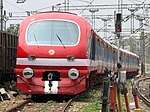Portal:Transport/Selected article/Week 36, 2008
Indian Railways (Hindi: भारतीय रेल Bhāratīya Rel), abbreviated as IR (भारे), is a Department of the Government of India, under the Ministry of Railways, and is tasked with operating the rail network in India. The Ministry is headed by a cabinet rank Railways Minister, while the Department is managed by the Railway Board. Indian Railways is not a private corporate body; however, as of recently, IR has adopted a corporate management style. Indian Railways has a total state monopoly on India's rail transport. It is one of the largest and busiest rail networks in the world, transporting seventeen million passengers and more than two million tonnes of freight daily. IR is the world's largest commercial or utility employer, with more than 1.6 million employees. The railways traverse the length and breadth of the country; the routes cover a total length of more than 63,327 km (39,500 miles). As of 2008, IR owned about 225,000 wagons, 45,000 coaches and 8300 locomotives and ran more than 18,000 trains daily, including about 8,984 passenger trains and 9,387 goods trains. Railways were first introduced to India in 1853. By 1947, the year of India's independence, there were forty-two rail systems. In 1951 the systems were nationalized as one unit, becoming one of the largest networks in the world. Indian Railways operates both long distance and suburban rail systems.
Recently selected: - -

